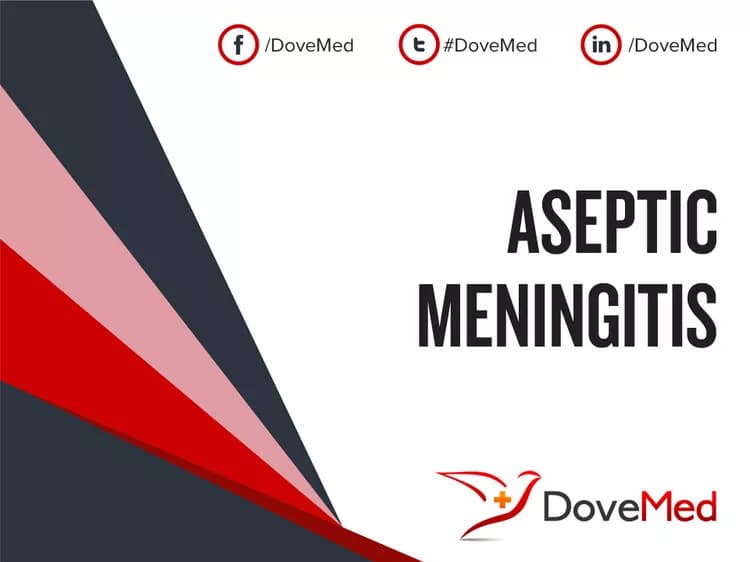What are the other Names for this Condition? (Also known as/Synonyms)
- Sterile Meningitis
What is Aseptic Meningitis? (Definition/Background Information)
- The brain is encompassed by several layers to protect it from any damage. From innermost, there is the pia mater, arachnoid mater, and dura mater, which makes up what is called the meninges
- Inflammation or swelling of the covering around the brain is called meningitis. Most cases of Aseptic Meningitis, which are frequently observed in newborn babies and children, are caused by viruses
- The signs and symptoms of Aseptic Meningitis include fever with chills, headache, increased light sensitivity, and generalized weakness. In severe cases, the complications associated with Aseptic Meningitis include seizures and superimposed bacterial infections
- The prognosis of aseptic meningitis depends on the severity of the condition. Nevertheless, a majority of the affected individuals recover within 1-2 weeks
Who gets Aseptic Meningitis? (Age and Sex Distribution)
- Aseptic Meningitis is commonly seen among neonates and children. However, the disease can be present in adults too
- It affects both male and female genders equally
- There are no studies that indicate the disease is more predominant in a particular racial or ethnic group
What are the Risk Factors for Aseptic Meningitis? (Predisposing Factors)
The risk factors associated with Aseptic Meningitis are:
- Being around people who are virally infected
- Occupational environment that can spread an infection such as hospital settings, nursing homes, or daycare centers
- Individuals with weak immune function
- Aseptic Meningitis is common in certain age groups such as children and teens
It is important to note that having a risk factor does not mean that one will get the condition. A risk factor increases one's chances of getting a condition compared to an individual without the risk factors. Some risk factors are more important than others.
Also, not having a risk factor does not mean that an individual will not get the condition. It is always important to discuss the effect of risk factors with your healthcare provider.
What are the Causes of Aseptic Meningitis? (Etiology)
Most cases of Aseptic Meningitis are caused by viruses. Some of the common viruses responsible for the infection are:
- Chickenpox virus
- HIV (human immunodeficiency virus)
- Herpes simplex type 2 virus
- Mumps virus
- West Nile virus
- Rabies virus
Other less common causes of Aseptic Meningitis may include:
- Fungal infections
- Syphilis
- Lyme disease
- Tuberculosis
- Drug allergies
- Autoimmune diseases
What are the Signs and Symptoms of Aseptic Meningitis?
The signs and symptoms associated with Aseptic Meningitis are:
- Fever with chills
- Severe, throbbing headaches
- Stiff neck
- General tiredness and fatigue
- Pain in the throat
- Muscle weaknesses
- Increased sensitivity to light
- Nausea and vomiting
- Abdominal discomfort
How is Aseptic Meningitis Diagnosed?
The diagnosis of Aseptic Meningitis may involve:
- Proper medical history and a thorough physical examination
Several tests, including blood tests and a lumbar puncture, may be conducted:
- The lumbar puncture (spinal tap) is a process in which a small amount of fluid present around the brain and spinal cord is removed to be examined in the laboratory
- Imaging studies such as a CT and MRI scans may be required to observe the extent of brain involvement
Many clinical conditions may have similar signs and symptoms. Your healthcare provider may perform additional tests to rule out other clinical conditions to arrive at a definitive diagnosis.
What are the possible Complications of Aseptic Meningitis?
The possible complications observed with Aseptic Meningitis are:
- Seizures
- Memory-related problems
- Superimposed bacterial infections
How is Aseptic Meningitis Treated?
Aseptic Meningitis can be cured with proper treatment. A majority of the patients with Aseptic Meningitis get better within 1-2 weeks.
- Patients are required to rest and stay well hydrated
- Pain and anti-inflammatory medications are given to control pain and fever
- Depending upon the cause of Aseptic Meningitis, antiviral, antifungal, or antibacterial medications are given accordingly
How can Aseptic Meningitis be Prevented?
Aseptic Meningitis can be prevented if proper measures are followed:
- Individuals who are at risk should avoid contact with those who have active infection
- Ensure proper sanitization such as regular hand washing
- Healthcare workers and individuals working in daycare centers should take appropriate protective measures
- Getting available vaccination against the viruses
What is the Prognosis of Aseptic Meningitis? (Outcomes/Resolutions)
- The prognosis of Aseptic Meningitis depends on the severity of the infection
- A majority of the affected individuals recover within 1-2 weeks
- Very few patients develop long-lasting illness
Additional and Relevant Useful Information for Aseptic Meningitis:
Children with Aseptic Meningitis should not be given aspirin because of the risk of developing Reyes syndrome; a syndrome that can seriously damage vital organs of the body, such as the liver and brain.
Related Articles
Test Your Knowledge
Asked by users
Related Centers
Related Specialties
Related Physicians
Related Procedures
Related Resources
Join DoveHubs
and connect with fellow professionals


0 Comments
Please log in to post a comment.